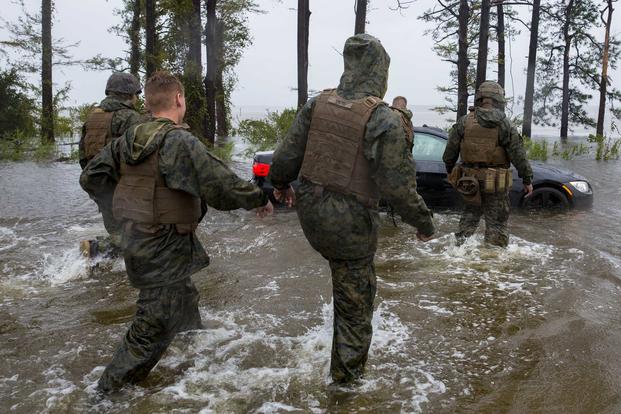Marines and their families who opted to head off base when Hurricane Florence struck the East Coast last month -- despite their commander's controversial choice to decline an evacuation -- could now see some of their expenses reimbursed.
Marine officials announced Wednesday that the service has been given the authority to reimburse troops, civilian employees and dependents who departed the area to escape the storm, which made landfall as a Category 1.
The move is likely to come as a financial relief for those who opted to leave Camp Lejeune, North Carolina, when troops were given special liberty status Sept. 11 for what they thought was a long weekend. They were later told not to return as planned, driving up the costs of their voluntary evacuation.
Claims for reimbursements are expected to begin Monday, leaders at Lejeune wrote in a Facebook post. Marines and other personnel are encouraged to contact their unit's administrative section or human resources department for details.
Related content:
- Evacuation Entitlements if the Military Tells You to Go
- Lejeune Commander Fires Back at Critics After Declining to Evacuate Base
- Marines' Norway Deployment, Training Missions Delayed by Hurricane Florence
Nat Fahy, a spokesman for Marine Corps Installations East, said the service estimates that about 27,000 troops assigned to II Marine Expeditionary Force left during the storm. But they won't know for certain until all of the claims have been processed.
"We are anticipating [reimbursements totaling] about $40 to $50 million," he added, "but ultimately it will depend on the number of claims received."
Brig. Gen. Julian Alford, who until recently served as Lejeune's commanding general, caused a stir on social media when he decided against issuing a mandatory evacuation of the base ahead of the storm. He told Marines and their families that many of the buildings on base were built to withstand storms like Florence, and said putting thousands on the roads in and out of base could be more hazardous than staying put.
Some complained on social media that the decision disregarded the safety of Marine families, and that it was unfair that other military families whose commanders issued mandatory evacuations were more likely to be reimbursed for their expenses if they opted to leave.
But on Sept. 15, Alford told them not to return as planned, allowing state, local and base officials to deal with flooding and downed debris in the aftermath of the storm.
That's why the reimbursement period covers only Sept. 15 to Sept. 23, Fahy said.
"On Sept. 11, Marines were given the option to voluntarily evacuate before the storm," he said. "On Sept. 15, those who had voluntarily evacuated were given an order not to return by the base commanding general. Thus, they are being reimbursed for the period from Sept. 15, when the order was issued, to the date of their return or Sept. 23 -- whichever occurred first."
As Florence hovered over the Carolinas for days last month, sections of Camp Lejeune were damaged in the storm. Families returned to find mold, standing water and collapsed ceilings in their base housing, Reuters reported. Mold was also found in a school, and a roof was ripped from a headquarters building aboard the sprawling base, Commandant Gen. Robert Neller told reporters this month.
The most common types of expenses service members and their families face during hurricane evacuations -- whether mandatory or voluntary -- include lodging and meals. Those applying for reimbursements will need to provide receipts for both, and will be paid the per-diem rates based on their locations, Fahy said.
"Claimants are advised to bring any receipts or credit card statements with them when they file," he added.
Marines, civilian employees and family members who left the area during the storm and plan to apply for reimbursements can learn more about the Joint-Travel Regulations here.
-- Gina Harkins can be reached at gina.harkins@military.com. Follow her on Twitter at @ginaaharkins.












